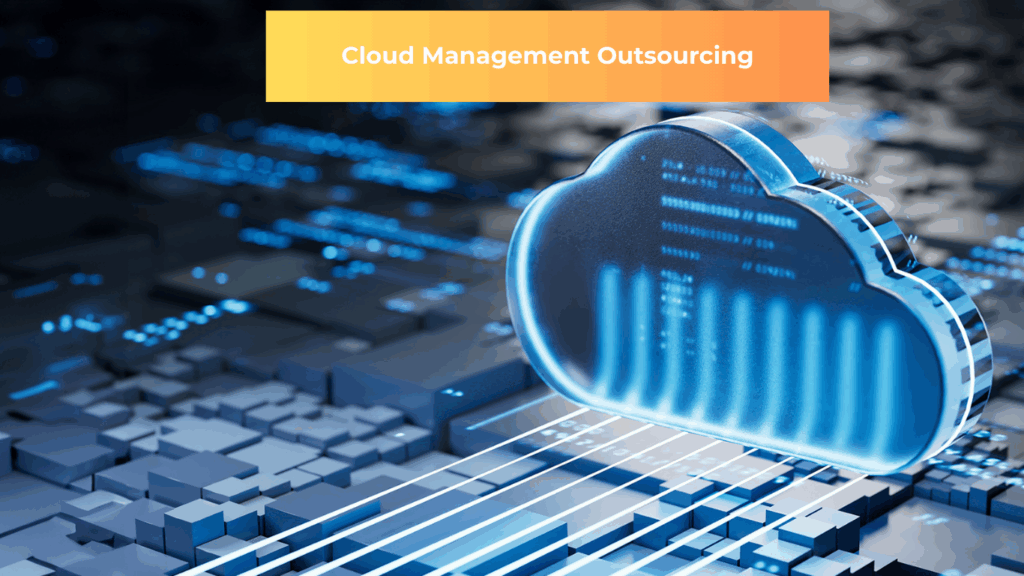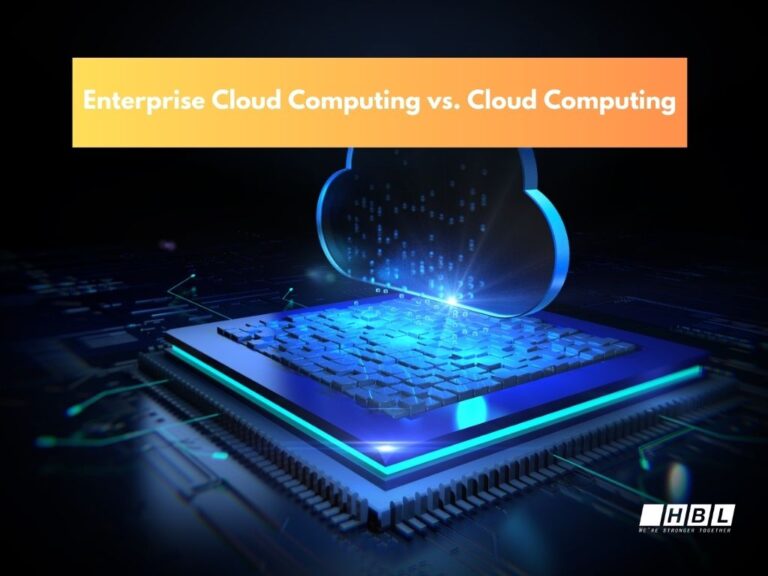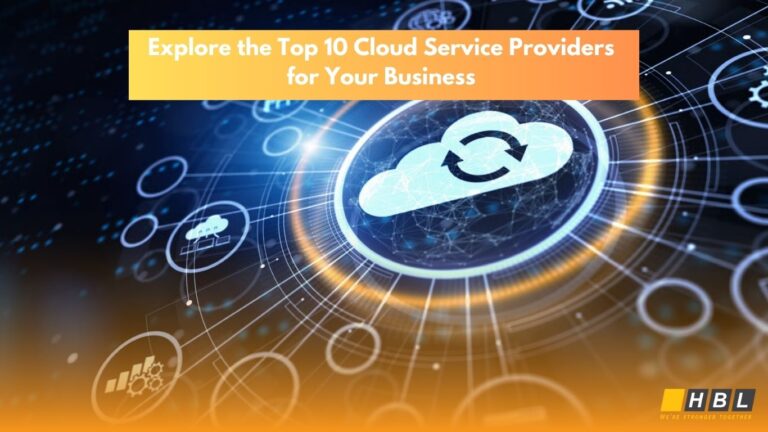Cloud management outsourcing is revolutionizing how businesses scale IT operations, with 94% of enterprises using cloud services to enhance efficiency. In the global B2B IT market, outsourcing cloud management addresses challenges like talent shortages and cost optimization while leveraging trends like AI adoption.
This article explores how cloud management outsourcing drives business growth, offering scalable, cost-effective solutions for modern enterprises.
What is Cloud Management Outsourcing?

Cloud management outsourcing involves delegating the management of cloud infrastructure, applications, and services to a third-party provider, known as a Managed Service Provider (MSP). It enables businesses to leverage software outsourcing and cloud services without maintaining in-house IT teams. By outsourcing, companies access scalable, secure cloud environments, aligning IT with strategic goals.
For example, MSPs handle tasks like server maintenance, data backups, and security updates, allowing businesses to focus on core operations. According to Statista, the IT outsourcing market will reach US$588.38bn by 2025, highlighting the growing reliance on cloud outsourcing for efficiency.
What’s Driving Cloud Management Outsourcing in 2026
Cloud management outsourcing is booming as businesses seek scalable, cost-effective, and secure IT solutions. With the global public cloud market projected to hit $723.4B in 2025, growing 21.5% year-over-year, companies are turning to cloud outsourcing to manage complex cloud environments.
| 2024
Spending |
2024
Growth (%) |
2025
Spending |
2025
Growth (%) |
|
| Cloud Application Infrastructure Services (PaaS) | 171,565 | 19.1 | 208,644 | 21.6 |
| Cloud Application Services (SaaS) | 250,804 | 18.1 | 299,071 | 19.2 |
| Cloud Desktop-as-a-Service (DaaS) | 3,466 | 7.7 | 3,849 | 11.1 |
| Cloud System Infrastructure Services (IaaS) | 169,818 | 21.3 | 211,856 | 24.8 |
| Total Market | 595,652 | 19.2 | 723,421 | 21.5 |
Table 1. Worldwide Public Cloud Services End-User Spending Forecast, 2024-2025 (Millions of U.S. Dollars) (Source: Gartner)
Here’s a simplified look at the key drivers, risks, and when to choose in-house, outsourced, or hybrid models for cloud management outsourcing.
Key Drivers of Cloud Management Outsourcing
AI and Cloud Growth
The surge in AI-driven cloud services and workload modernization is fueling demand for cloud management outsourcing. Businesses are deploying AI and data platforms that require specialized expertise to operate, secure, and optimize 24/7. Cloud outsourcing ensures reliable performance, allowing companies to focus on innovation while MSPs handle complex infrastructure.
Hybrid and Multicloud Adoption
By 2027, 90% of organizations will adopt hybrid cloud strategies, increasing the need for cloud management outsourcing to streamline integration and governance. Hybrid cloud outsourcing and multicloud management standardize networking, identity, and data policies across platforms, reducing complexity with prebuilt tools and expertise.
Cost Pressures and FinOps
Managing cloud costs is a top challenge, with 84% of organizations struggling to control spending. Cloud management outsourcing to FinOps specialists and MSPs, used by 60% of businesses, provides visibility and accountability. MSPs optimize costs through rightsizing and usage monitoring, making cost-effective cloud solutions achievable.
Scaling and Talent Shortages
With one-third of organizations spending over $12M annually on public clouds, cloud management outsourcing delivers expertise and 24/7 coverage faster than hiring in-house. The XaaS market is growing at 20% in 2026, and MSPs provide scalable cloud solutions to meet demand without delaying projects.
Time-to-Market and Resilience
Cloud providers offer tools to speed up development, but cloud management outsourcing ensures these are integrated into reliable, compliant systems. With public cloud services expected to double by 2028, outsourcing enhances cloud-based IT solutions for faster delivery and operational resilience.
Compliance, Data, and Security
Hybrid cloud outsourcing simplifies governance for AI and hybrid workloads, ensuring data sovereignty and security. MSPs centralize policy enforcement and monitoring, aligning with the shared responsibility model to meet compliance needs like GDPR or HIPAA, reducing cloud outsourcing risks.
How Cloud Management Outsourcing Works
Cloud management outsourcing follows a comprehensive framework to align cloud infrastructure with business objectives, ensuring seamless integration, performance optimization, and scalability. This structured process enables organizations to leverage software outsourcing and cloud services efficiently, minimizing disruptions and maximizing ROI. Below are the detailed steps involved:
- Needs Assessment: Managed Service Providers (MSPs) conduct an in-depth analysis of the organization’s business goals, IT infrastructure, and operational requirements. This includes evaluating workloads, application dependencies, and compliance needs. For example, a retail company might need real-time inventory tracking, requiring robust cloud storage and analytics capabilities.
- Migration Strategy Development: MSPs design a tailored migration plan to transition data, applications, and workloads to the cloud with minimal downtime. This involves selecting the appropriate cloud model (public, private, or hybrid) and tools like AWS Migration Hub or Azure Migrate. A phased approach ensures critical systems remain operational during the transition.
- Service Setup and Configuration: MSPs configure cloud services, including compute resources, storage, networking, and security protocols. This step includes setting up virtual private clouds (VPCs), load balancers, and identity access management (IAM) policies. For instance, a healthcare provider might require HIPAA-compliant configurations to secure patient data.
- Ongoing Management and Optimization: MSPs provide continuous monitoring, patch management, and performance optimization using tools like AWS CloudWatch or Google Cloud Operations. They ensure high availability, disaster recovery, and compliance with standards like GDPR or ISO 27001. Automation scripts may be deployed to streamline routine tasks.
- Scalability and Flexibility Adjustments: Cloud resources are dynamically scaled to meet fluctuating demands, leveraging auto-scaling groups or serverless architectures like AWS Lambda. This ensures scalable cloud solutions that adapt to peak loads, such as during e-commerce sales seasons, without overprovisioning costs.
- Performance Analytics and Reporting: MSPs provide detailed analytics on cloud performance, cost efficiency, and resource utilization using dashboards like Azure Cost Management. These insights help businesses optimize spending and align cloud usage with strategic goals.
For example, a retail company outsourcing its network to the cloud might adopt Infrastructure-as-a-Service (IaaS) to manage servers via Amazon EC2 or Google Compute Engine. This setup ensures cost-effective cloud solutions, enabling real-time inventory tracking and seamless customer experiences. HBLAB’s expertise in cloud migrations ensures smooth execution across all phases, delivering tailored solutions for global businesses.
Advantages of Cloud Management Outsourcing

Cloud management outsourcing delivers transformative benefits for organizations seeking agility and efficiency in the global B2B IT market. By leveraging software outsourcing and cloud services, businesses can achieve significant operational and strategic advantages. Here are the key benefits, enriched with technical insights:
- Cost Efficiency: Outsourcing eliminates the need for on-premises hardware and dedicated IT staff, reducing capital expenditure and maintenance costs by up to 30% compared to in-house setups. For instance, using AWS S3 for storage can cut costs compared to maintaining physical servers. Statista reports cloud cost savings as a top driver for outsourcing adoption.
- Scalability and Elasticity: Cloud outsourcing enables dynamic resource scaling to match demand, leveraging tools like Kubernetes or AWS Auto Scaling. This is ideal for scalable cloud solutions, such as e-commerce platforms handling seasonal spikes, ensuring performance without overpaying for unused capacity.
- Access to Specialized Expertise: MSPs provide access to certified cloud architects and DevOps engineers skilled in platforms like AWS, Azure, and GCP. This fills talent gaps, especially in areas like AI-driven cloud services, where expertise in machine learning frameworks (e.g., TensorFlow) enhances analytics capabilities.
- Enhanced Security and Compliance: MSPs implement enterprise-grade security measures, including encryption (AES-256), multi-factor authentication, and intrusion detection systems. Compliance with standards like GDPR, HIPAA, or PCI-DSS is ensured through regular audits and secure configurations, reducing breach risks.
- Flexibility and Global Collaboration: Cloud outsourcing supports remote access and collaboration via tools like Microsoft Teams or Slack integrated with cloud platforms. This enables global teams to work seamlessly, leveraging cloud-based IT solutions for real-time data sharing and project management.
- Proactive Performance Optimization: MSPs use AI-driven tools like Azure Monitor to predict and resolve performance bottlenecks before they impact operations. This ensures high availability (e.g., 99.99% uptime with AWS SLA) and enhances user experiences.
IDC projects global cloud infrastructure spending to reach $130.2B by 2026, underscoring the strategic value of software outsourcing and cloud services. HBLAB’s tailored solutions maximize these benefits, delivering cost-effective, scalable cloud environments.
Challenges and Risks of Cloud Management Outsourcing
While cloud management outsourcing offers significant advantages, it also presents challenges that require careful management to ensure success. Addressing these cloud outsourcing risks is critical for maintaining security, performance, and business continuity. Below are the key challenges, expanded with technical details:
- Data Security and Privacy Risks: Outsourcing sensitive data to the cloud increases exposure to breaches or unauthorized access. For example, misconfigured S3 buckets have led to high-profile data leaks. MSPs must implement robust encryption, zero-trust architectures, and regular vulnerability assessments to comply with regulations like GDPR or HIPAA. Gartner notes 99% of cloud security failures are due to customer misconfigurations.
- Vendor Lock-In: Dependency on a single MSP or cloud provider (e.g., AWS or Azure) can limit flexibility due to proprietary tools or data formats. Transitioning to another provider may incur high migration costs or data portability issues. Adopting multi-cloud strategies or open standards like Kubernetes mitigates this risk.
- Communication and Coordination Barriers: Time zone differences, language barriers, or cultural misalignment can disrupt workflows between in-house teams and MSPs. For instance, asynchronous communication may delay issue resolution. Clear communication protocols and tools like Jira or Confluence can streamline collaboration.
- Service Disruptions and Downtime: MSP outages or misconfigured services can impact business operations. For example, a 2023 AWS outage affected multiple industries. Robust SLAs guaranteeing 99.9% uptime and disaster recovery plans (e.g., multi-region backups) are essential to minimize disruptions.
- Cost Overruns: Unoptimized cloud usage, such as overprovisioned instances or unmonitored serverless functions, can lead to unexpected costs. MSPs must provide cost analytics tools like AWS Cost Explorer to ensure transparency and control.
- Compliance and Regulatory Challenges: Ensuring compliance with industry-specific regulations (e.g., PCI-DSS for retail) requires continuous monitoring and documentation. MSPs must align with global standards and provide audit trails to avoid penalties.
To mitigate these risks, businesses should select MSPs with proven track records, like HBLAB, which holds CMMI Level 3 certification for process excellence and implements enterprise-grade security measures.
Clear SLAs, regular performance reviews, and multi-cloud strategies further reduce cloud outsourcing risks, ensuring reliable, secure services.
In-House, Outsourced, or Hybrid: What’s Best?
Choosing between in-house, cloud management outsourcing, or a hybrid model depends on business needs, scale, and goals. Here’s when each approach works best:
When In-House Fits
- Strategic Control: Keep cloud management outsourcing minimal when cloud systems are critical to competitive advantage, requiring custom architectures for proprietary data or low-latency applications. In-house teams maintain full control over performance and security.
- Stable Scope and Talent: In-house works for smaller cloud setups with predictable growth and sufficient skilled staff for 24/7 operations and FinOps for cloud outsourcing. This suits organizations with clear compliance needs managed internally.
- Regulatory Constraints: Strict data residency or regulatory rules may favor in-house control, with external audits for specific tasks like security testing, avoiding full cloud outsourcing.
When Outsourcing Fits
- Rapid Scaling: Cloud management outsourcing accelerates AI and data platform deployment, ensuring 24/7 reliability without hiring delays. MSPs standardize scalable cloud solutions for faster project launches.
- Cost Control: With 84% of businesses facing cost challenges, outsourcing FinOps for cloud outsourcing provides immediate savings through usage optimization and anomaly detection, delivering cost-effective cloud solutions.
- Specialized Skills: Cloud outsourcing offers expertise in identity, networking, and SRE across hybrid multicloud setups, meeting the demands of global operations and complex compliance regimes.
When Hybrid Wins
- Balanced Control: Hybrid models keep strategic tasks like architecture and governance in-house while outsourcing routine operations and FinOps for cloud outsourcing to MSPs. This aligns with 90% hybrid cloud adoption trends by 2027.
- Reduced Risks: Spreading tasks across internal teams and MSPs minimizes vendor lock-in while leveraging cloud management outsourcing for scalability and expertise, ensuring robust continuity plans.
- Outcome-Driven: Assign strategic tasks in-house and operational tasks like monitoring and cost optimization to MSPs. Tie MSP performance to metrics like availability and cost savings, reviewed quarterly for transparency.
👉 Ready for scalable cloud solutions? Connect with HBLAB today.
HBLAB – Your Partner in Cloud Management Outsourcing
HBLAB empowers businesses with cloud management outsourcing, delivering scalable, secure, and cost-effective IT solutions. With 630+ professionals, including 30% senior-level experts, we provide unmatched expertise in software outsourcing and cloud services.

Our CMMI Level 3 certification ensures process excellence, while our AI expertise since 2017, supported by partnerships with VNU’s Institute for AI, drives innovation. Offering cost-effective cloud solutions—30% lower than local rates—and flexible engagement models (offshore, onsite, dedicated teams), HBLAB ensures seamless integration and robust security. Our global presence and strong English proficiency enable us to address universal IT challenges, from talent shortages to compliance needs.
Conclusion
Cloud management outsourcing empowers businesses to scale, reduce costs, and leverage emerging technologies like AI. By addressing challenges like talent shortages and ensuring compliance, it drives growth in the global B2B IT market.
Partnering with HBLAB for cloud management outsourcing ensures success.
👉 Contact HBLAB for cloud management outsourcing solutions! Get started today.
FAQs
1. What is cloud outsourcing?
Cloud outsourcing refers to the practice of delegating the management of IT infrastructure, applications, and services to a third-party provider, known as a Managed Service Provider (MSP), using cloud technology.
This approach allows businesses to access scalable, secure, and efficient cloud environments without maintaining large in-house IT teams.
By leveraging software outsourcing and cloud services, companies can focus on core operations while MSPs handle tasks like server maintenance, data backups, and security updates, ensuring flexibility and cost efficiency.
2. What are the big 3 cloud providers?
The big three cloud providers are Amazon Web Services (AWS), Microsoft Azure, and Google Cloud Platform (GCP). These industry leaders offer robust cloud-based IT solutions, including computing power, storage, and advanced analytics, tailored to diverse business needs. Their platforms support scalable cloud solutions, enabling organizations to deploy applications globally, optimize costs, and integrate cutting-edge technologies like AI and machine learning.
3. What are the 4 types of cloud services?
The four main types of cloud services are Infrastructure as a Service (IaaS), Platform as a Service (PaaS), Software as a Service (SaaS), and Function as a Service (FaaS).
IaaS provides virtualized computing resources like servers, PaaS offers development platforms, SaaS delivers ready-to-use software, and FaaS enables serverless computing for specific functions.
Each type supports software outsourcing and cloud services, allowing businesses to choose the right model for their operational and strategic goals.
4. What are cloud management services?
Cloud management services encompass the ongoing tasks performed by MSPs to monitor, secure, and optimize cloud environments. These services include performance monitoring, security patching, resource allocation, and compliance management, ensuring cost-effective cloud solutions.
By using tools like AWS CloudWatch or Azure Monitor, MSPs help businesses maintain high availability, reduce costs, and align cloud operations with strategic objectives.
5. Can a business’s network be outsourced to the cloud?
Yes, a business’s network can be outsourced to the cloud using Infrastructure as a Service (IaaS) or virtual private clouds (VPCs). This approach provides secure, scalable connectivity through cloud-based networking solutions like AWS Direct Connect or Azure Virtual Network. Outsourcing networks reduces the need for on-premises hardware, enabling businesses to achieve scalable cloud solutions with enhanced flexibility and global accessibility.
6. How is cloud computing associated with outsourcing?
Cloud computing is closely tied to outsourcing as it provides the scalable, on-demand resources that MSPs manage for businesses. By leveraging cloud platforms like AWS or Azure, cloud management outsourcing reduces the burden of in-house IT management, allowing companies to access advanced technologies without heavy investments.
MSPs handle tasks like updates, backups, and security, enabling businesses to focus on growth and innovation.
7. Why can outsourcing cloud services be a risk?
Cloud outsourcing risks include potential data breaches, vendor lock-in, and service disruptions. Storing sensitive data in the cloud requires robust security measures, while dependency on a single MSP can limit flexibility and increase switching costs. To mitigate these risks, businesses should select reputable MSPs with clear SLAs and implement strategies like multi-cloud architectures to ensure secure cloud outsourcing.
8. How does HBLAB ensure secure cloud outsourcing?
HBLAB ensures secure cloud outsourcing through its CMMI Level 3 certification, which guarantees process excellence and adherence to global standards. With robust security protocols, including encryption, zero-trust architectures, and continuous monitoring, HBLAB protects client data and ensures compliance with regulations like GDPR and HIPAA.
Our 630+ professionals and AI-driven cloud services deliver reliable, cloud-based IT solutions tailored to your business needs.
CONTACT US FOR A FREE CONSULTATION
Read More
– Crushing Data Bottlenecks with Next-Gen Database as a Service
– AWS and Azure: Which Cloud Platform Reigns Supreme?
– Cloud Service Providers: Who Leads the Market & Why It Matters




